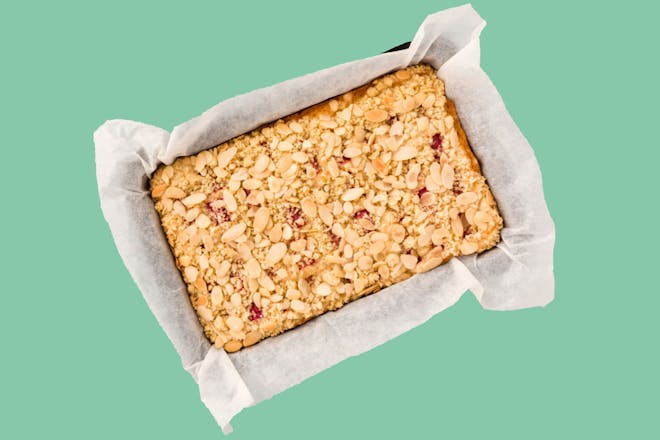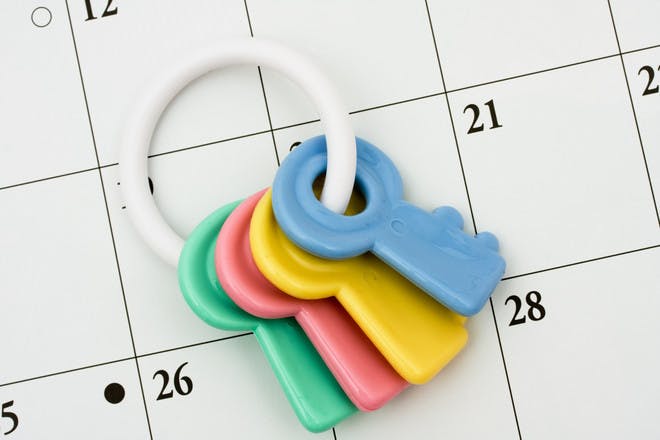It's officially your final week of pregnancy! Your baby will be here any time (unless of course you go overdue, in which case it could be another couple of weeks!). Here's what's going on and what to expect now that you're 39 weeks pregnant and only have one week to go until you reach your due date.
This page contains affiliate links, which means we may earn a small amount of money if a reader clicks through and makes a purchase. All our articles and reviews are written independently by the Netmums editorial team.
What’s happening at 39 weeks?
Here are the key things you can expect from your pregnancy at this stage:
- Your baby's fully developed and getting ready to meet you
- You may experience discharge as your body prepares for labour and birth.
- Get ready to understand why other mums say 'you'll know' when contractions happen!
- Read up on how to prevent SIDS (sudden infant death syndrome) once your baby's born.
How big is your baby?
This week, your baby is roughly the size of a traybake cake, having grown about 1cm since last week (50.7cm) and weighing around 3.28kg.
Fully developed, your baby will keep on slowly gaining fat and growing more hair until they're out.
FREE NEWBORN NAPPIES
The fine hair (lanugo) and white greasy substance (vernix) that have covered your baby's skin throughout the third trimester may be starting to shed now. Some babies are covered in them at birth, others aren't – you won't know until you meet your newborn.
In baby boys, their testicles will often have descended by now, though it sometimes doesn't happen until several months after the birth. In both boys and girls, a surge of hormones around this week will mean that genitals for both sexes can look a bit swollen when they’re born.
The only thing that won't be developed yet is your baby's eye colour; that'll develop over your baby's first month, as the pigment develops after contact with light. Babies who are born with blue or grey eyes could end up with blue, brown, hazel or green several months after they are born!
What to expect this week: leaking and discharge
Noticed the occasional damp patch in your bra? This is quite normal as your breasts are producing the rich first milk called colostrum , which will give your baby a great start if you’re breastfeeding.
It probably means your best silk tops are out, but you can feel more comfortable by tucking breast pads into your bra.
You may also notice more discharge in your knickers. This could be the ‘bloody show’ or mucus plug from the neck of your cervix and is one of the early signs of labour . It can appear days or weeks before labour starts for real.
The mucus plug can come out all at once in a lump, or over a few days. It may have brown, pink or red in it so don't be alarmed. Not all pregnant women notice theirs so there's no need to worry if you don't see any discharge at this stage.
However, if you're worried about any discharge or notice any bleeding that doesn’t seem normal, contact your midwife or labour ward immediately.
Are you feeling ready for labour and birth ? If this is your first baby, it can be hard to know what to expect. You can read the official advice all day long, but it doesn't always reflect real experiences.
Head to the Netmums forum to read some real-life birth stories and find out the truth behind labour and birth.
You can also remind yourself of your pain relief options and practice your relaxation exercises . If you're worried about labour, these ways to ease your fears of giving birth may help.
In these final weeks, while you're bound to be excited about meeting your baby, it's also important to keep an eye out for pre-eclampsia . Call your midwife or NHS 111 if you have sudden swelling in your feet, hands or face, a very bad headache, severe pain under your ribs, or a fever. The same goes for severe itching, which could be a sign of ICP/OC .
And of course, as always, do seek help immediately if you notice any change to your baby's usual pattern of movement.
What to do this week: understand safe sleeping for babies
Once your baby is born, you'll more than likely become fixated on how long they sleep, longing for the day they sleep through the night. Find some safety tips on cots, cribs and moses baskets here .
But how long your baby sleeps for isn't as important as how safely you put them down to sleep, particularly in the early weeks and months after the birth.
So, before baby comes along, it's a good idea to understand the guidelines in place for how to put your little one down to sleep safely.
Following the latest guidelines can help reduce the risks of sudden infant death syndrome (SIDS), which used to be referred to as cot death.
Things every parent should know to do include:
- Always put your baby on their back for every sleep, day and night.
- Put your baby to sleep in a separate cot or moses basket in the same room as you for the first 6 months, even during the day.
- Try to keep the room temperature between 16 -20°C.
- Never smoke, or allow anyone else to smoke, near or around your baby.
- Use a clean, firm and flat mattress that's protected by a waterproof cover – ideally it should be new or in good condition.
- Keep the cot clear of any items such as bumpers, toys and loose bedding.
- Latest advice also advises not to use sleep nests and cushioned sleep pods .
Find out more about putting your baby to sleep safely here.
As for when your baby will sleep through the night, unfortunately you'll have a while to wait! Most babies sleep on-and-off throughout the day and night to start with, as they have tiny tummies and need to be fed often.
Your baby will be at least 3 months old before they're able to sleep for longer stretches at night, and at least 6 months old before they can drop the night feeds completely.
So prepare yourself for some broken sleep for time to come, and take heed of the age-old advice to 'sleep when your baby sleeps' – housework can wait!
Your 39 week to-do list
1 Make sure your baby has a clean and safe cot or crib to sleep in after the birth, ideally in the same room as you.
2 Keep sleeping on your side for naps and nighttime sleep until your baby is born.
3 Get that hospital playlist ready. It could get you through a long stint on the labour ward. Include some gentle and calming music to help you relax, plus upbeat tunes to energise you; you'll never know exactly what mood you'll want until you're in labour.
4 Have a last flick through some baby names. Check out our baby name ideas for inspiration.
5 Have a read through our baby section to arm yourself with lots of advice and information on caring for your baby after the birth.
Related articles
What to watch this week...
Get expert tips on what to expect at 39 weeks pregnant from our midwife.
What happens next week...
Want to know what happens when you're 40 weeks pregnant ? Or maybe you've already forgotten what you read last week ? Just click on the numbers above to find out more about what to expect when you're that number of weeks pregnant.








